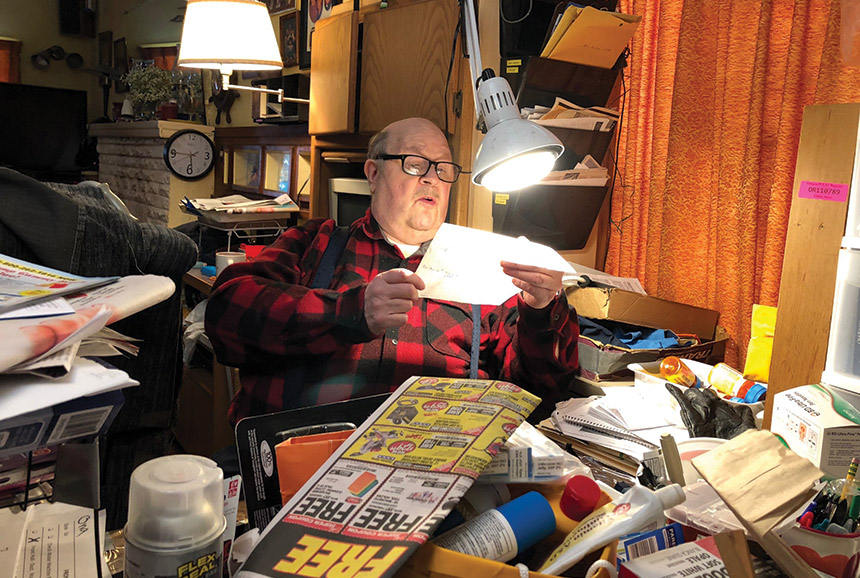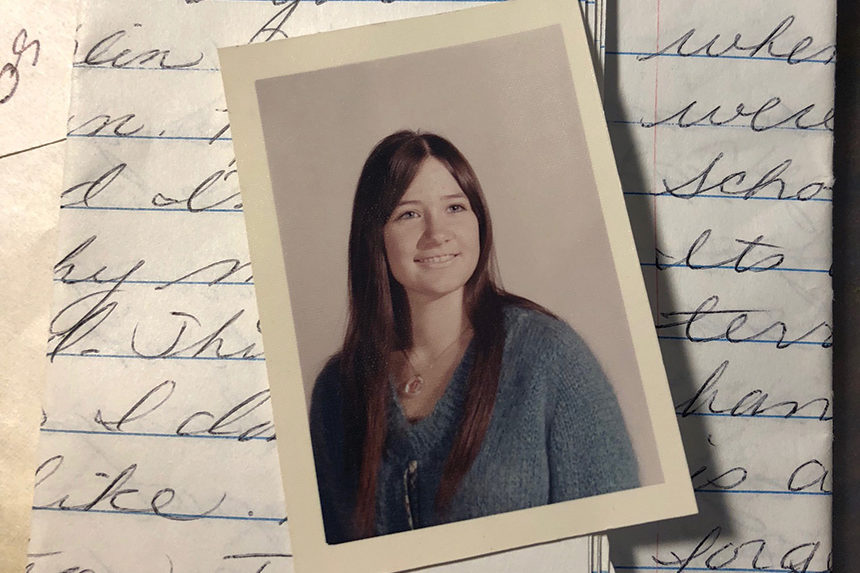Last winter, Terry Stone carried the mail to a table in his Southeast Portland home. Among the catalogues and advertising fliers, he spotted an envelope. At 71, Stone doesn’t have great eyesight, what with cataracts in both eyes and macular degeneration in one, and he had to hold the envelope close to read the delicate, handwritten name on the front:
Miss Della Ipox.
Stone turned on a high-powered lamp to better see the envelope, discolored with age. The address was correct — the house where Stone and his wife have lived since 1976. The envelope, with no return address, had two stamps: one current, the other featuring Franklin D. Roosevelt. It cost 6 cents.
On the envelope’s back, written in heavy black ink, a note — “sorry so late” — and, underneath it, two indecipherable words.
Stone opened the envelope and found four neatly folded pages, all handwritten, and a small color photograph of a smiling girl. Written on the back of the photo: Della Ipox, 16 years old. Franklin High School. Jan. 1970. He glanced at the first page. It was her homework. He tucked everything back into the envelope.
Maybe, he thought, the carrier had mistaken the handwritten 3 for an 8.
He left his house to explore the neighborhood to see if houses on surrounding streets had an address similar to his.
Nothing.
Days later, Stone pulled out the letter and read it from beginning to end. He wanted to return it to the rightful owner, but there was no return address. His wife told him to forget it. Honestly, it was nothing more than a decades-old homework assignment.
Stone couldn’t toss it. But he did need help. He called the contact number for The Oregonian, figuring someone there could help find Della. He reached a salesman in circulation who had no interest in listening to a man wanting to return an old letter to a girl.
Stone dialed again, randomly changing the order of the last two numbers in the sequence. He reached a woman in a meeting room. He tried again. No answer. On the fourth attempt, he dialed my office.
I answered.
At Stone’s house I met a character, in the best sense of the word. I learned about his life, how he met his wife, what he’d done for work, and how they bought the house they’ve lived in. He and his wife had been unable to have kids. Perhaps it was the girl’s photo that made Stone believe the letter was more meaningful than homework.
He searched a cluttered desk and held up the letter, pointing to a postal mark showing it had been processed on January 31, 2018. He wondered who mailed it, and why. I asked him why he cared. Still holding the letter, he turned reflective.
“Our past always matters,” he said. “Always.”
He handed me the letter.
“It’s yours now,” he said. “Good luck.”
The letter, deeply creased, had been written on lined paper, three holes along one side for a binder, the type of paper every high school kid used back in the day. I began reading.
A teacher named Mr. Robertson asked his students, in early 1970, to answer 12 questions to predict what would transpire in the next decade. In 1975, when the students were 21, he planned to mail the letters in self-addressed envelopes to his students.
Among the things Miss Della Ipox predicted:
President Richard Nixon would run again in 1972 but would lose. By 1976, humans will have landed on Mars. Something will be invented so cars won’t pollute. The Vietnam War will have ended. An overnight cure for pimples will be discovered. Kids won’t smoke as much pot, but they’ll find a new kick. She will be married by 1976, maybe to a boy named Gary, and she hopes to have a little girl, although a boy would be just fine. She doubts she will have a job, content to be a housewife and mother.
Stone had entrusted this letter to me, explaining why it mattered to him.
But why should it matter to me?
Or to anyone?
I read the letter again.
Well Della, it’s been about 5 years since I wrote this. If there’s much change, remember when you wrote this! When you were a junior, Franklin High School, 16 years old, Jan 7, 1970.
It’s about 11:45 p.m. and I’m terribly tired that’s why my handwriting is so bad.
This is a picture of me, so I don’t forget what I look like. My teacher was Mr. Robertson. This was his idea.
Hope you are happy, best wishes and may God bless you.
It was in her words that I stumbled over the answer to my question.
The letter was written at a time in life when a kid’s idea of the future extends out just about a month or so. It was written at that moment before the reality of adulthood, with heartaches, disappointments, and setbacks, intrudes the way it always does and always will.
I looked at the photo. I imagined this girl, staring back at me, near midnight, pen in hand, at a desk in her room in the very house I’d just visited.
Della Ipox was me.
And you.
She was the child we all once were.

A call to the administrative offices at Portland Public Schools, along with an explanation of what I was doing, got me the address to Nick Robertson’s suburban home. On a slip of paper, which I dropped in his mail slot, I left my name and telephone number. I said I was curious about a letter he’d recently mailed to Della Ipox.
Days later, he called. A lifelong teacher and an Oregon Hall of Fame basketball coach, he’d bounced around, spending two years at Franklin High School before working for decades at Beaverton High School, from where he retired.
“I didn’t put a return address on them,” he said. “If even one gets to a kid, that will be special.”
“I was in my twenties at Franklin,” said Robertson, now 77. “I was practically a kid myself.”
Robertson said it was a tumultuous era then, with protests as the students made their voices heard. He wanted the assignment to be a thought-provoking way for students to look at the world they would soon be a part of. After gathering the envelopes, he put them in a shoebox and took them home.
But with all the moves he’d made over the years, he forgot about the letters.
Then, in January, Robertson decided to clean out his home office and found a shoebox on a closet shelf.
“I’ll be damned,” he said. “It was those letters.”
There were more than 30, and I asked Robertson why he didn’t throw them all away. By then, those students would all have been 64. Chances were not one of them would even recall the assignment.
“I made a promise,” he said. “After 42 years in education, I wanted to keep it.”
Understandable, I said.
But why did he care?
His voice changed.
“My son was 17 when he died in a car wreck,” Robertson said. “He was a senior, not much older than the kids in that class of mine.”
He fell silent.
“I’d love to have a letter my son wrote when he was young,” Robertson said.
So, he bought stamps for the letters, scribbled an apology on the back, signed his name, and put them all in the mail. Off they went to those childhood homes of long ago.
“I didn’t put a return address on them,” he said. “I didn’t want them to come back. They are out there in the world. If even one gets to a kid, that will be special. I wonder where life took all of them.”
CHESAPEAKE — Della Mae Tisdale, 55, was born in Portland, Oregon, June 25, 1953, and passed away April 15, 2009, in her home surrounded by her family.
She was preceded in death by her parents Edgar Cicero and Ethel Ann Ipox.
Della proudly served our country in the United States Navy and was a real estate paralegal for 20 years. She was the owner of Mop Heads & Paper Dolls and was a distributor for Herbalife International. She also worked as a permit engineer with Wellsco Inc. Della was active in the Shorty Stallings Memorial Scholarship Fund and was presented volunteer of the year award in 1998.
She coached girls softball and was a past president of the Indian River Girls Softball Association. Anybody who knew Della would say she was positive, smiling, loved kids, enjoyed bowling, and was a great-natured person. She enjoyed her grandkids, family, friends, and her time surf fishing and relaxing at their cottage on Hatteras Island with her husband Rick.
I called the Virginia funeral home and the church where the services were held, asking for help in tracking down Rick Tisdale. Days later, I was given a telephone number.
“I understand you were Della’s husband?”
“Son, the way I see it, I still am.”
He told me that he and Della met in 1986, and they were married in 1988.
“We were together for more than 20 years,” he said. “In 2003, she found out she had cancer. She took all the pills and did all the treatment. Then it raised its ugly head and took her from me.
“So,” he asked, “what can I do for you?”
I told Tisdale I had been given a letter that his wife had written when she was 16 years old. The man who had received it unexpectedly in the mail had entrusted it with me to return it to the rightful owner.
“A letter?” he asked. “That’s a hell of a note.”
I explained what had happened, and then I asked him to tell me about his wife. He said she joined the Navy out of high school and moved to Norfolk, where she met a man and married. They had two kids and later divorced. Tisdale, his voice booming in my headset, said a co-worker invited him over for a birthday celebration one August night and Tisdale, figuring there’d be free beer, showed up.
“Della was there,” he said. “She was a great woman.”
The phone fell silent, and for a moment I wondered if I’d lost the connection.
“I miss everything about her,” he said. “She was my best friend.”
I told Tisdale I would mail the letter that had been entrusted to me.
“I have her obit hanging on the wall in my den,” he said. “I believe I’ll put that letter next to it.”
We said goodbye.
I saw the letter on my desk and read, one final time, that passage she had written late one night when her future stretched out before her: Hope you are happy, best wishes and may God Bless you.
Della Ipox, 16, Franklin High School, January, 1970.
Rest in peace.
EPILOGUE: Della Ipox did marry and have kids as she imagined in 1970. But she also worked outside the home, having a full career. She never married Gary, who must have been a boy in her class. She had two children, a boy and a girl.
President Richard Nixon did run again in 1972 but didn’t lose. He won easily, setting the stage for the Watergate crisis. Despite the increased popularity of electric and hybrid cars, most automobiles still pollute.
Human technology has made it to Mars but not humans. Teenagers still smoke pot. Marijuana is legal now in many states, but not for people under 21.
And it goes without saying, but many 16-year-olds still dream of an overnight cure for acne.
She predicted cars would be the main form of transportation, but the bus would continue to be important. She did not foresee the popularity of commuting on a bicycle.
This article is featured in the November/December 2020 issue of The Saturday Evening Post. Subscribe to the magazine for more art, inspiring stories, fiction, humor, and features from our archives.
Featured image: Tom Hallman, Jr. / The Oregonian
Become a Saturday Evening Post member and enjoy unlimited access. Subscribe now



